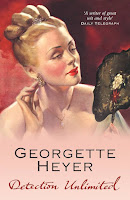 |
| (Amazon UK link) |
Apparently I read this aloud to my teenage sons fourteen years ago, but I had entirely forgotten the plot. It features a small community of diverse people, most of whom are spending the afternoon at a tennis party. Gradually they disperse to their various homes, and the early chapters follow several individuals in a way that I found a bit confusing as there are so many characters involved.
However, high drama happens when the somewhat saintly Mavis rushes into her neighbour’s house, to say that she’s found her uncle dead, shot by a bullet, in the garden. She is distraught, despite him being (as we quickly learn) not a particularly nice person. He treated her like an unpaid housekeeper, and was generally rather disliked.
Chief Inspector Hemmingway of Scotland Yard, who features in several of Heyer’s crime novels, is called in to investigate. It becomes apparent that several of the local residents had the opportunity to have committed the terrible deed, and many of them (including the niece) have some kind of motivation, too. The Inspector relies on his intuition alongside a likeable way of getting alongside people, and encouraging them to chatter. His sidekick, Inspector Harbottle, disapproves of some his methods, and their interchanges provide some light relief and even mild humour in quite a tense book.
Heyer’s gift was that of characterisation. Her plots wre not as elaborately constructed as Agatha Christie’s, the best-known author of this mid-20th century genre of light crime fiction. There are a few red herrings in this novel - pretty much everyone in the village developed their own theories about who did the evil deed, and they all present their ideas to the Chief Inspector. 'Detection Unlimited' is exactly what happens.
But I didn’t have much idea ‘whodunit’ until the point at which Hemingway starts to back-track and look again at some of the evidence or conversations he had not taken very seriously. When the perpetrator is discovered, and everything falls into place, I could see it clearly, but I didn’t feel any strong sense that in fact this was the only possible solution.
Still, I enjoyed reading it. There’s very little gore or unpleasantness, and we don’t get to know the victim before the crime is committed, so it’s not emotionally draining. I would recommend it to anyone who likes character-driven crime fiction of this kind. But don’t expect the twists and turns that occur in a Christie novel.
Not always in print, but available in Kindle form.
Review copyright 2017 Sue's Book Reviews
No comments:
Post a Comment